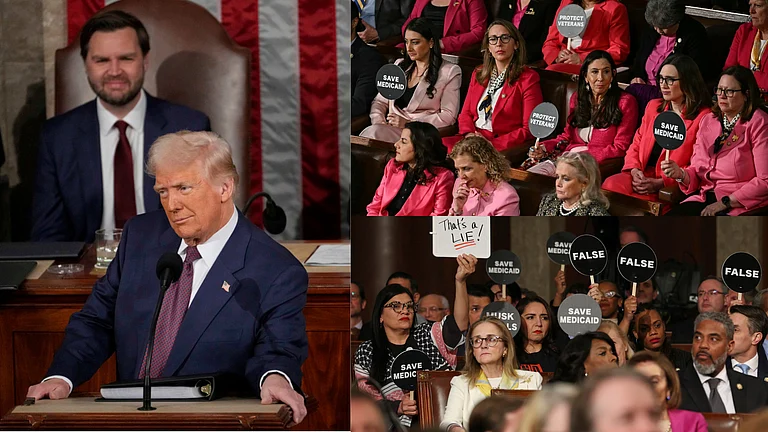On January 20, 2025, Donald Trump assumed office as President of the United States. Within a day, he signed a series of executive orders, prompting state attorneys to scramble in a legal offensive that could redefine the US Constitution.
At the heart of the USA’s current legal turmoil is Executive Order (EO) 14160. It strips citizenship from American-born children of undocumented immigrants, including those born to parents on temporary US visas. This marks a departure from established law, which explicitly states that a person is naturalised as a US citizen if “the person is born in the United States.” Within hours of Trump signing the order, attorneys general from Washington, New Jersey, Arizona and Oregon filed suits, arguing that the order “flagrantly violates the 14th Amendment” of the US Constitution.
State lawyers argued that Trump’s attempt to redefine who is “subject to the jurisdiction of the United States” at birth is essentially an effort by the Executive to rewrite core tenets of US law. They warned that if EO14160 was allowed to stand, it could have dire consequences for federal funding and Social Security.
In its lawsuit against EO14160, the Brazilian Worker Centre Inc. and Lawyers for Civil Rights argued that Trump’s order “treats the targeted citizens as a subordinate caste of native-born Americans, entitled to fewer rights, benefits and entitlements than other Americans due to their parents’ alienage,” adding that it “violates their right to equal protection”.
Federal courts across the US also pushed back. In a highly publicised win against EO14160, Boston District Court Judge Leo Sorokin granted a preliminary injunction blocking the order on February 13. In his ruling, Sorokin stated that the order was inconsistent with the US Constitution, which “confers birthright citizenship broadly.” He became the fourth federal judge to block EO14160.
On March 13, the Trump administration petitioned the US Supreme Court to lift the injunction, The New York Times reported. The government has asked the Court to either limit the nationwide injunctions to the individuals or states involved in the lawsuits while the cases proceed, or for the SC to allow federal agencies to begin developing plans and issuing public guidance for banning birthright citizenship if Trump’s effort ultimately holds up in court, the report said.
Freezing Federal Funds
As of February 20, Trump had signed more than 70 executive orders, the most by any president in their first 100 days in over 40 years.
Within his first week in office, he signed 36 additional orders, including several under the banner of “Ending the Weaponization of the Federal Government.” Then, on January 27, the Office of Management and Budget (OMB) announced a “temporary pause” on federal grants, loans and other financial assistance programs that may be “implicated by” these executive orders.
In their legal filings, state attorneys argued that the OMB’s move was aimed at, but not limited to, cutting financial assistance for foreign aid, nongovernmental organisations, diversity, equity and inclusion (DEI) initiatives, “woke” gender ideologies and green energy programmes. Calling the executive order and the resulting freeze overly vague, they stated it “violates the APA (Administrative Procedure Act) and is unconstitutional.”
Among the affected programmes are Child Care and Development Block Grants, which provide childcare assistance to low-income families, the National School Lunch Program, which serves meals to children in public, private and charter schools, funding for war veteran nursing care facilities and infectious disease research.
Twenty-two state attorneys wrote in their joint complaint that the OMB’s funding freeze “will result in immediate and devastating harm to Plaintiff States.” In Connecticut, Attorney General William Tong condemned the freeze as “a full assault on Connecticut families,” vowing that the state would “stand its ground and fight back.”
Ultimately, Rhode Island District Judge John J. McConnell Jr. sided with the states. In his order dated January 31, 2025, Judge McConnell criticised the administration’s actions, stating, “The Executive’s categorical freeze of appropriated and obligated funds fundamentally undermines the distinct constitutional roles of each branch of our government.”
A Restructuring of Federal Power
One of Trump’s biggest challenges at present is the controversy surrounding his executive orders restructuring the federal government. State attorneys have called the creation of the new Department of Government Efficiency (DOGE), spearheaded by billionaire Elon Musk, the greatest “threat to democracy.”
“There is no greater threat to democracy than the accumulation of state power in the hands of a single, unelected individual,” says the court filing, adding that this legal maxim, originally meant to prevent abuses by 18th-century monarchs, “applies just as well to 21st-century tech barons”.
The legal battle over Trump’s executive orders reflects two opposing visions. Supporters argue they restore executive authority, while opponents see them as a threat to democracy.
DOGE’s creation was foreshadowed in August 2024. In a YouTube video, Trump “enthusiastically” responded to Musk’s offer to take a leadership role in a government efficiency commission, calling him “the greatest cutter.”
The Trump administration has defended DOGE, arguing that the department will implement cost-cutting measures and streamline government operations. However, state attorneys contend that the President is “oblivious to the threat” posed by his decision to delegate “virtually unchecked authority to Mr. Musk without proper legal authorization from Congress.”
The legal challenge against DOGE is straightforward: the US President does not have unlimited power to create new offices without congressional approval. “The Founders of this country fought for independence from the British monarchy in part because of the King’s despotic power to create an unlimited number of government offices and fill them with his supporters. This practice so severely undermined their freedoms that it became a listed grievance in the Declaration of Independence,” states the complaint filed before a District Judge in Columbia.
The U.S. Constitution’s Appointments Clause requires the President to obtain Senate consent before appointing individuals to high offices, including ambassadors, public ministers and consuls, Supreme Court judges and all other officers of the United States.
The Columbia challenge to DOGE is revealing.
It describes actions that can only be deemed as abuse of power, especially if DOGE’s creation is ultimately found unconstitutional.
“During this initial period, DOGE secured access to sensitive material in dozens of federal agencies, including the Department of the Treasury, the Office of Personnel Management, the Centers for Medicare and Medicaid Services, the Department of Education, the Department of Energy (which oversees nuclear weapons), the Department of Defense, and the Centers for Disease Control (and Prevention),” says the lawsuit.
It goes on to detail clashes between DOGE and federal employees, including mass firings at the Department of Education, after which DOGE personnel reportedly turned on white noise machines to drown out protests. In another incident, DOGE employee Tom Krause allegedly pressured then-acting Treasury Secretary David A. Lebryk to halt certain foreign aid payments through the Bureau of the Fiscal Service. Lebryk was subsequently placed on administrative leave and replaced by former hedge fund manager Scott Bessent. On February 2, Bessent granted DOGE personnel full access to the US BFS payment systems, which store Social Security and Medicare customer data, as well as the states’ bank account and financial information.
Another concerning allegation in the complaint suggests that Musk is “not fully briefing the White House…about his plans, and that the White House is effectively in the dark.”
While detailed judicial opinions on DOGE-related challenges are still emerging, the fact that 19 states have co-signed the complaint underscores the gravity of the constitutional issues at stake. State attorneys warn that Musk, “with President Donald J. Trump’s approval, has roamed through the federal government, unravelling agencies, accessing sensitive data and causing mass chaos and confusion.” They argue that DOGE cannot be allowed to stand, as it would set a dangerous precedent in which the President violates the principle of separation of powers.
Transgender Healthcare Under Siege
Trump’s disdain for the transgender community was central to his campaign. On March 11, he praised his administration for banning “biological males” (transwomen) from women’s sports.
Upon taking office, he withdrew federal funds from hospitals and universities providing gender-affirming care for transgender youth. Healthcare providers, advocacy groups and state officials condemned the move as medically unfounded and a violation of civil rights. New York Attorney General Letitia James warned healthcare institutions that halting gender-affirming care would breach state anti-discrimination laws.
Attorneys general from Washington, Oregon, Minnesota and Colorado, along with medical professionals, sued to block the funding freeze. In Seattle, Judge Lauren King extended a temporary restraining order, ruling the order lacked legal standing and likely violated constitutional protections.
The Courts as the Last Bulwark
Federal judges have repeatedly checked Trump’s potential overreach, but the Supreme Court’s stance on his executive orders remains uncertain.
With lifetime appointments, the court is split along party lines and Trump’s two conservative appointees have tilted the balance towards the right. However, on March 11, the court rejected the administration’s claim of immediate power to fire a watchdog chief, slowing efforts to block $2 billion in foreign aid.
Yet, even the Supreme Court’s authority is in question and while Trump says he will comply with rulings, Vice President JD Vance and Elon Musk have suggested they may defy court orders.
“If a judge tried to tell a general how to conduct a military operation, that would be illegal. If a judge tried to command the attorney general in how to use her discretion as a prosecutor, that’s also illegal. Judges aren’t allowed to control the executive’s legitimate power,” wrote Vance on X in February this year. If such a situation arises, America could face an unprecedented constitutional crisis.
The Stakes
The legal battle over Trump’s executive orders reflects two opposing visions of governance. Supporters argue they restore efficiency and executive authority, while opponents see them as unconstitutional overreach threatening democracy. For states, the stakes are high. The federal funding freeze jeopardises essential services like healthcare, education and public safety. Without relief, budget shortfalls could trigger widespread economic ripple effects. As Connecticut Attorney General William Tong has warned, “If the President and the federal government violate Connecticut’s sovereignty, laws and policy, Connecticut will stand its ground and fight back.”
MORE FROM THIS ISSUE
Avantika Mehta is a senior associate editor based in New Delhi
This article is a part of 해외카지노's April 1, 2025 issue 'World At Reset', which explores the ongoing changes in the global geopolitical order. It appeared in print as 'In Trump's Court'.






















